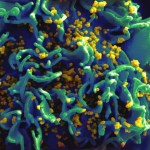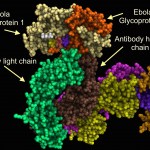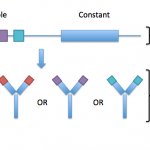antibodies
On Aetiology, Tara C. Smith explores the story of Gaetan Dugas, a man who was long blamed for precipitating the AIDS epidemic in the United States. The vilification of Dugas had nothing to do with science; instead he was dubbed "patient zero" in a misinterpretation of his study moniker "patient O" (for Outside). Dugas' portrayal in the media turned him into a modern Typhoid Mary, but he was not an originator of the U.S. epidemic, as a 2007 molecular analysis proved and a new paper in Nature confirms. Smith writes "This is the real scandal and lingering tragedy of Dugas. His story was used to…
One wonderful thing that has come two US citizens being infected Ebola (and successfully treated for the disease) is *education* the general public is getting about this, frankly, 'scary' virus.
Im not talking about the bizarre nonsense/missed opportunity posted by Sanjay Gupta and his 'producer' Danielle Dellorto. Of course science bloggers have capitalized on this opportunity to educate people (its kinda what we *do*). But some journalists in main-stream-media, unlike Gupta and Dellorto, have taken a moment to speak to actual scientists working on Ebola/the…
As an unprecedented outbreak of Ebola crosses borders in West Africa, people are asking new questions about the virus and its potential to turn into a global pandemic (hint: it's not gonna happen). Greg Laden writes "The disease is too hot to not burn itself out, and it has no human reservoir. Ebola accidentally broke into the human population earlier this year or late last year." The current numbers from the WHO suggest 1800 confirmed and suspected cases of Ebola so far with a mortality rate edging down toward 55%.
Last week some in the U.S. objected to bringing two American patients…
In 1925, dogsledders raced through the frozen Alaskan bush to bring antiserum to the isolated village of Nome. The antiserum arrived in time, saved the lives of many villagers from the horrors of diphtheria, and inspired the Iditarod, a famous race in celebration of the dog sledders' heroic feat.
West Africa could use a similar effort today. Richard Harris's blog at NPR has a good story about doctors' efforts to develop and use antiserum to treat Ebola. According to ABC news, Dr. Kent Brantly, who is being seen at Emory University Hospital was treated…
At the risk of seeming like a one-trick pony, and piggybacking on my recent appearance on the Savage Lovecast, I thought I would close the loop on immune reactions to semen. I've already written about allergens being transmitted in semen, and about women having allergies to seminal plasma itself. In the latter case, I say women having allergies not only because the only examples I found were in women, but also because by definition men cannot have allergic reactions to semen. In response to a comment on that post I wrote:
If a man did get an immune response, it would probably be called "…
I took my first immunology class at UCSD in the spring of 2004. I've always been interested in signaling (how cells take information from the outside and translate that to the inside) but the subject matter of this class was set to disappoint - in terms of signaling, it more or less stopped at the outer membrane of cells. Even though looking back, I can see now that a subject as vast as immunology has to cut some corners in a 10 week course, early on that quarter I was a bit frustrated. But just before the first midterm, we started learning about one of the most bizarre behaviors of cells…
EMAIL! (technically, a paraphrased really great question from someone at FreeOK!)
Dear ERV--
Is there any reason why I, a young healthy adult, really *need* to get the flu shot every year? Even if I do get the flu, wont that just make my immune system stronger?
Blech. Flu shots. Every damn year people are bugging us to get the flu shot. But no one likes shots. They cost like $10-$20. Have to take off work or run to get one in between classes. And then your arm hurts allllll daaaaay and you might get a headache or a little fever. UUUUUUUGH WHYYYYY????? WHYYYY????
"Do I *have* to…
A few months ago, Kathryn Applegate wrote a couple posts on the adaptive immune system. Its relatively inoffensive. Just the bland 'science' Im used to hearing from theists, flavored with dull gender normative stories and analogies containing her husband and toddlers and clothes/shoes.
And then at random points within the sterile descriptions of science, Applegate insists her personal choice of deity has something to do with said sterile science. No evidence or explanation why she is talking about her deity. Hysterically, her posts could be summed up as "Look at all these totally natural…
tags: evolutionary biology, immunology, immune response, antibodies, parasite, avian pox virus, Poxvirus avium, nest fly, Philornis downsi, birds, ornithology, Darwin's Finches, Medium Ground Finch, Geospiza fortis, Ecuador, Galapagos Islands, researchblogging.org,peer-reviewed research, peer-reviewed paper
A male Medium Ground Finch, Geospiza fortis, sits on a tree branch in Ecuador's Galapagos Islands.
Image: Jen Koop.
People often view the Hawaiian islands as a tropical paradise, the ideal vacation site, but you wouldn't agree with this assessment if you happen to be a bird. According…
One of the holy grails of modern medicine is the development of a vaccine against HIV, the virus that causes AIDs. An obstacle to attaining this goal has been the difficulty in stimulating the immune system to make it produce the right kinds of antibodies. A recent finding in Science describes a gene that controls production of these antibodies and may provide insights to the development of an effective vaccine. (1).
Antibodies are special kinds of proteins that bind to things, often very tightly. If they bind to the right molecules, they can prevent viruses from infecting cells and target…




